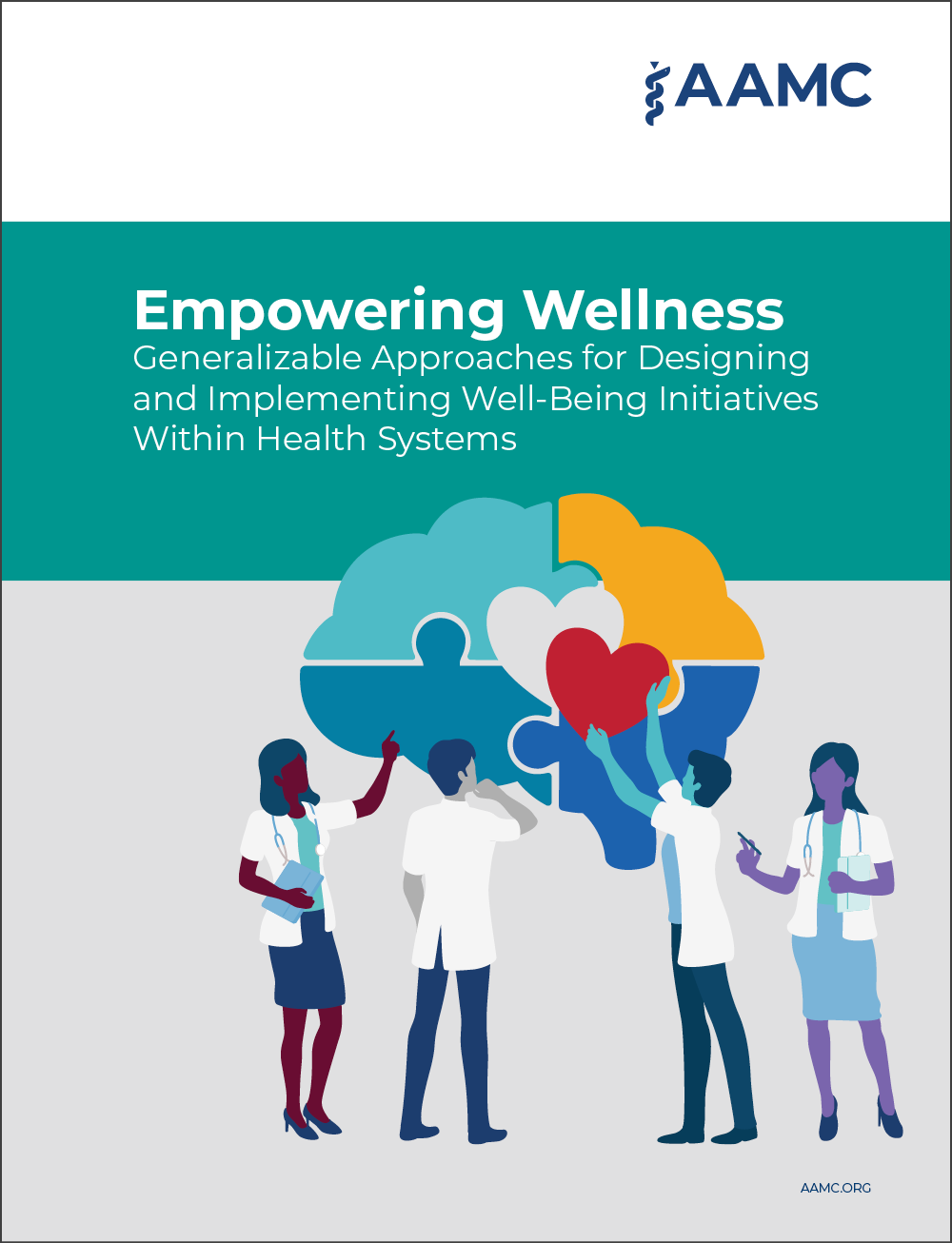- Collection
Well-Being in Academic Medicine
Well-being in academic medicine is a critical issue facing faculty members, clinicians, researchers, residents, and students. resources on this page have been developed or curated by the AAMC with input from the AAMC Council of Faculty and Academic Societies (CFAS) and other partners at the AAMC. Please email Eric Weissman, senior director faculty and academic society engagement, if you have resources to share with your colleagues, and we will consider including them on these pages.
Articles and Resources

- Empowering Wellness: Generalizable Approaches for Designing and Implementing Well-Being Initiatives Within Health Systems
This AAMC publication highlights strategies to promote a culture of wellness and features essays written by wellness leaders from across the country that describe programs they launched and implemented to create healthier, more supportive learning and work environments for clinicians, faculty, and learners.
- The Rise of Wellness Initiatives in Health Care: Using National Survey Data to Support Effective Well-Being Champions and Wellness Programs
This AAMC report presents data from two recent surveys of health care professionals highlighting common elements of wellness programming and describing the roles of the well-being champions who lead and support wellness efforts. The report provides new data, insights, and recommendations to help institutions establish and continue to develop wellness leaders and initiatives. Based on these findings, the report outlines 10 recommendations to help organizations promote a culture of well-being.
- Together: The Healing Power of Human Connection in a Sometimes Lonely World
Written by Vivek Murthy, MD, the 19th surgeon general of the United States, this book shares Murthy’s own experiences and observations about the toll that disconnection and loneliness are taking on the health of our society. He makes the case that loneliness is a public health concern because of its influence on a variety of epidemics, including substance use disorders, anxiety, and depression. Murthy goes beyond diagnosing the problem and proposes solutions to help people and society become more connected.
- Physician and Nurse Well-Being and Preferred Interventions to Address Burnout in Hospital Practice: Factors Associated With Turnover, Outcomes, and Patient Safety
A study published in JAMA found a link between burnout and retention problems among nurses and physicians in a hospital setting. The study concluded that hospitals that can be “characterized as having too few nurses and unfavorable work environments had higher rates of clinician burnout, turnover, and unfavorable patient safety ratings.” Furthermore, those nurses and physicians who remained were less likely to be interested in well-being programs and resiliency training.
- How hospitals are using A.I. to fight doctor burnout
This article from CNBC discusses how hospitals are using artificial intelligence, including an app from Microsoft's Nuance unit, to reduce burnout among physicians and nurses by helping to offload some of their administrative tasks.
- National Plan for Health Workforce Well-Being
The National Academy of Medicine released the National Plan for Health Workforce Well-Being in October 2022 to drive collective action to strengthen health workforce well-being and restore the health of the nation. It also created the Action Collaborative on Clinician Well-Being and Resilience, of which the AAMC is a partner. The collaborative is a network of leaders and representatives of major health professional organizations and health systems across the United States, including CFAS-member societies. It seeks to raise the visibility of clinician anxiety, burnout, depression, stress, and suicide; improve baseline understanding of challenges to clinician well-being; and advance evidence-based, multidisciplinary solutions to improve patient care by caring for the caregiver.
- Changes in Burnout and Satisfaction With Work-Life Integration in Physicians Over the First 2 Years of the COVID-19 Pandemic
This article published in Mayo Clinic Proceedings and coauthored by Tait Shanafelt, MD, Colin P. West, MD, PhD, and Lotte M. Dyrbye, MD, evaluates the prevalence of burnout and satisfaction with work-life integration in US physicians at the end of 2021, compared with 2020, 2017, 2014, and 2011.
- Associations of physician burnout with career engagement and quality of patient care: systematic review and meta-analysis
This meta-analysis provides compelling evidence that physician burnout is associated with poor function and sustainability of healthcare organizations primarily by contributing to the career disengagement and turnover of physicians and secondarily by reducing the quality of patient care.
- Many Medical Schools Lack Safeguards to Address, Prevent Faculty Bullying
MedPage Today covered the often-underreported challenges presented by faculty bullying within medical schools, reporting on the work of Maya Iyer, MD, MEd, of Nationwide Children's Hospital in Columbus, Ohio, and colleagues, in a paper published in JAMA Network Open.
- American Diagnosis’: Two Indigenous Students Share Their Path to Medicine - Kaiser Health News
‘Rezilience,’ Season 4 of the ‘American Diagnosis’ podcast, traces the resilience of Indigenous peoples in the U.S. taking action to protect the health and well-being of their communities.
Getting Help
- National Suicide Prevention Lifeline: 1-800-273-8255
- Physician Support Line: 1-888-409-0141
- Mental Health America: a community-based nonprofit dedicated to addressing the needs of those living with mental illness and to promoting the overall mental health of all.
- American Foundation for Suicide Prevention's Interactive Screening Program: Institutions can implement this online program utilized by mental health services.
- Preventing Physician Suicide: an online module from the American Medical Association’s (AMA's) Steps Forward initiative (0.5 CME credits).
- Validated Instruments To Assess Work-Related Dimensions of Well-Being: from the National Academy of Medicine's Action Collaborative on Clinician Well-Being and Resilience.